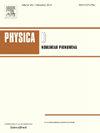Stabilising millennial oscillations in large-scale ocean circulation with a delayed feedback due to a circumpolar current
IF 2.7
3区 数学
Q1 MATHEMATICS, APPLIED
引用次数: 0
Abstract
The global ocean circulation plays a pivotal role in the regulation of the Earth’s climate. The specific pattern and strength of circulation also determines how carbon and nutrients are cycled and via the resulting distribution of dissolved oxygen, where habitats suitable for marine animals occur. However, evidence from both geological data and models suggests that state transitions in circulation patterns have occurred in the past. Understanding the controls on marine environmental conditions and biodiversity requires a full appreciation of the nature and drivers of such transitions. Here we present stable millennial oscillations of meridional overturning circulation in an Earth system model of intermediate complexity, cGENIE, that appear to only occur in the presence of a circumpolar current. To demonstrate that a circumpolar current can act as a driver of stable oscillations, we adapt a simple ocean box model to include a delayed feedback to represent the effect of a circumpolar current on meridional overturning circulation. We investigate the millennial oscillatory solutions that arise in the box model by bifurcation analysis and show that the model can reproduce the same bifurcation structure observed in the Earth system model. Our results provide new insights into the nature of oscillations that could have occurred under certain continental configurations in the geological past, and also highlight the potential influence of the changing Antarctic circumpolar current speed on the stability of the Atlantic meridional overturning circulation.
由绕极流引起的延迟反馈稳定大尺度海洋环流的千年振荡
全球海洋环流在调节地球气候方面起着关键作用。循环的特定模式和强度也决定了碳和营养物质如何循环,以及由此产生的溶解氧分布,适合海洋动物的栖息地在哪里出现。然而,来自地质数据和模型的证据表明,环流模式的状态转变在过去发生过。要了解对海洋环境条件和生物多样性的控制,就必须充分认识这种转变的性质和驱动因素。在这里,我们提出了一个中等复杂程度的地球系统模式cGENIE中经向翻转环流的稳定千年振荡,这种振荡似乎只发生在环极流存在的情况下。为了证明环极流可以作为稳定振荡的驱动因素,我们调整了一个简单的海洋箱模型,包括一个延迟反馈,以表示环极流对经向翻转环流的影响。我们通过分岔分析研究了箱型模型中出现的千禧年振荡解,并表明该模型可以再现地球系统模型中观察到的相同的分岔结构。我们的研究结果为在过去地质时期某些大陆构造下可能发生的振荡性质提供了新的见解,并强调了南极环极流速度变化对大西洋经向翻转环流稳定性的潜在影响。
本文章由计算机程序翻译,如有差异,请以英文原文为准。
求助全文
约1分钟内获得全文
求助全文
来源期刊

Physica D: Nonlinear Phenomena
物理-物理:数学物理
CiteScore
7.30
自引率
7.50%
发文量
213
审稿时长
65 days
期刊介绍:
Physica D (Nonlinear Phenomena) publishes research and review articles reporting on experimental and theoretical works, techniques and ideas that advance the understanding of nonlinear phenomena. Topics encompass wave motion in physical, chemical and biological systems; physical or biological phenomena governed by nonlinear field equations, including hydrodynamics and turbulence; pattern formation and cooperative phenomena; instability, bifurcations, chaos, and space-time disorder; integrable/Hamiltonian systems; asymptotic analysis and, more generally, mathematical methods for nonlinear systems.
 求助内容:
求助内容: 应助结果提醒方式:
应助结果提醒方式:


